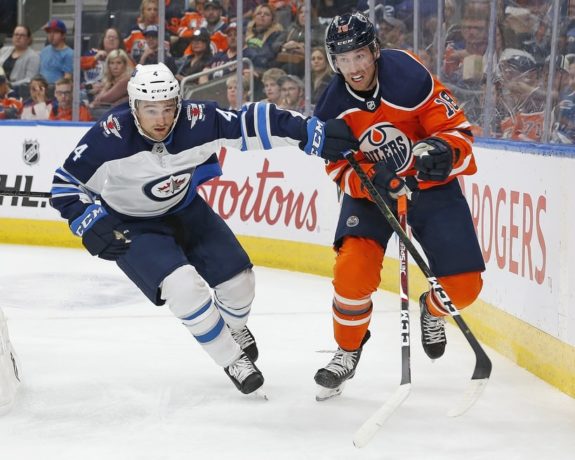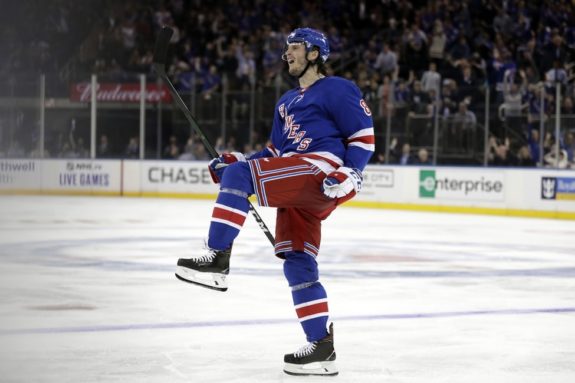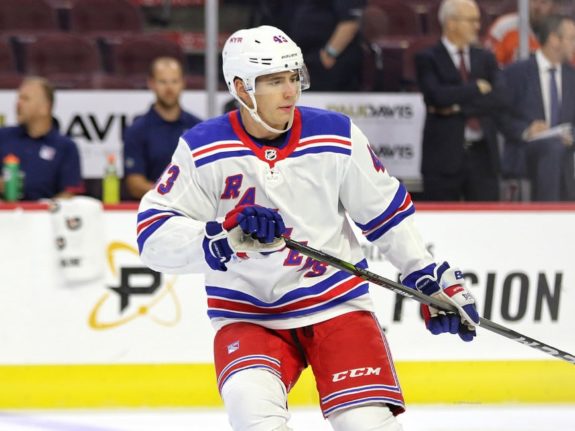When the Winnipeg Jets traded Jacob Trouba to the New York Rangers in June, they drew the ire of fans, many of whom felt general manager Kevin Cheveldayoff got a poor return for the 25-year-old entering his prime. Meanwhile, Blueshirts fans were rejoicing and most regarded the deal as highway robbery.
Related: Is Trouba Trade Truly Terrible for Jets?
Five months later, the trade isn’t looking quite as lopsided for the Rangers as everyone thought it would be.
Pionk Is Much Improved
Winnipeg may not have the glitz and glamour of Broadway’s bright lights (okay, it definitely doesn’t), but Neal Pionk has found a starring role in the prairie city.

The biggest criticisms against him in the wake of the trade were that his possession numbers were poor and that his defensive abilities were deficient. They were valid complaints considering his numbers. In retrospect, however, the concern was overblown as the 24-year-old was in his first full NHL season and the Rangers were one of the NHL’s poorer defensive teams.
Despite playing on a 2019-20 Jets team that is terribly inconsistent and unpredictable, Pionk’s analytics are much better than a season ago. His Corsi For Percentage at Even Strength (CF%) and Fenwick for at Even Strength (FF%) have both taken huge jumps; His CF% has risen nearly ten points to 53.0 and his FF% has gone up nearly six to 49.7.
Related: Pionk Exceeding Jets’ Expectations
Pionk has recorded two goals and seven assists this season and is skating an average of 23:13. He was a workhorse when the Jets were down to five defensemen for the final two periods of Saturday’s matchup against the Vegas Golden Knights, skating a career-high 29:24 in a 4-3 overtime win.
He is also a team-high plus-seven; impressive considering the Jets sport a negative goal differential.
Trouba’s Numbers Not so Flattering
Trouba’s stats show he’s struggling early in his Big Apple tenure. His stats are worse across the board than the man he was traded for.
As part of a Rangers d-corps that is a work in progress, just like the Jets, his CF% and FF% are well below Pionk’s at 40.7 and 43.5, far and away the worst numbers of his seven-year career. They’re also some of the worst in the NHL.

He has six points, three fewer than Pionk; half of those and his only goal was scored against the Jets in the Rangers’ home opener more than a month ago. He isn’t on pace to match the career-high 50 points he put up a season ago and he’s been pulled off their top power-play unit at times.
Trouba’s logged an average 23:36 of ice time, slightly more than Pionk, but he’s a minus-2. He’s logged fewer hits than Pionk, has given the puck away more often, but has blocked many more shots.
Rangers’ Writers Aren’t (Too) Worried about Trouba
Despite his numbers, THW Rangers contributors aren’t overly concerned about Trouba.
“I don’t care about that stuff,” Jordan Goldberg said in regards to Trouba’s poor possession stats. “I care about what I see with my eyes and how he affects the game. Being on a bad team can negatively affect your analytics no matter how good you are.”
“Fenwick is a bit of a misleading stat,” Jeb Biggart said. “And as far as Corsi goes, the entire Rangers team posts negative numbers.”
“All in all, Trouba probably isn’t playing like an $8 million defenseman, but that doesn’t suggest he’s been bad at all. Him and Adam Fox are regularly the best defenseman on the ice,” Biggart added, noting Trouba has been paired with rookie Libor Hajek, who has only 17 games of NHL experience.

Biggart pointed out that Trouba lost his spot on the team’s top power-play unit to Tony DeAngelo, and believes his shot selection is rushed at times. That’s a recurring foible. He filled in on the Jets’ power play last season when Dustin Byfuglien and Josh Morrissey were injured and had trouble hitting the net. Opposing penalty killers were fine with surrendering shots to him and they keyed on the Jets’ more dangerous forwards.
“Teams give him space and his shot selection can often lead to turnovers,” Biggart noted.
Tom Castro acknowledged Trouba’s numbers are “ugly” thus far and said he has been inconsistent and “had some real stinkers” while playing with Hajek.
“Hajek has definitely struggled badly at times so that probably plays a role in Trouba’s numbers,” Castro said. “Not to overcook this discussion but he grades out as below average so far.”
Small Sample Size but Jets Getting Better of the Trade
Castro and Biggart both noted that the season is still young and it’s a small sample size, making it harder to judge Trouba’s performance, “especially when the entire (Rangers) team is bad,” according to Biggart.
They’re right: The player with the greater impact on their teams’ fortunes will only be apparent after the 82-game campaign is said and done. The 2019-20 season is in its nascency and players are still settling into their new surroundings.

So far, Pionk has settled in better than Trouba. Any Jets fans still losing sleep about the deal can rest easy, because their team got rid of a player who didn’t want to be in Winnipeg and in return got a player with a ton of upside who’s improving on his weaknesses.
In the same ilk, Rangers fans shouldn’t panic. Trouba is a bona-fide top-pairing guy and will be a cornerstone to build around after signing a seven-year extension in mid-July.
Right now, though, the Jets are reaping greater rewards than the Rangers when you compare the principal players side by side. And that’s not even factoring in Ville Heinola, who the Jets chose with the 2019 20th overall pick also included in the swap who looks to be a huge part of their future.